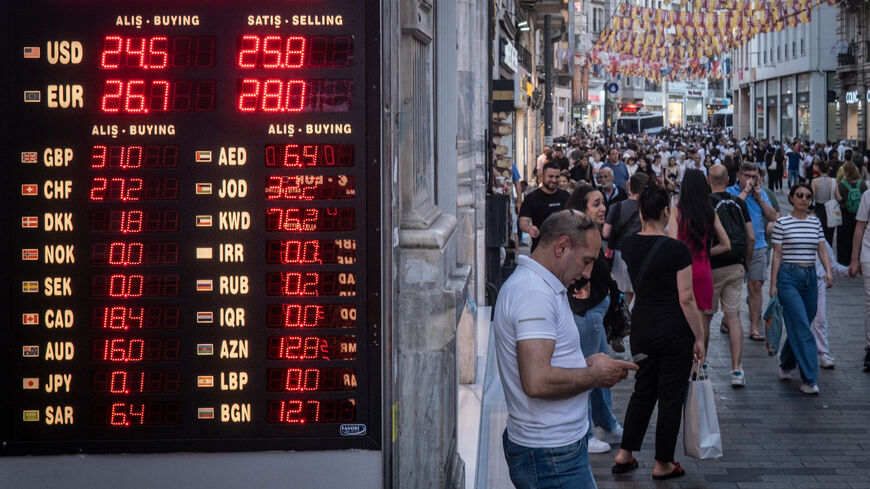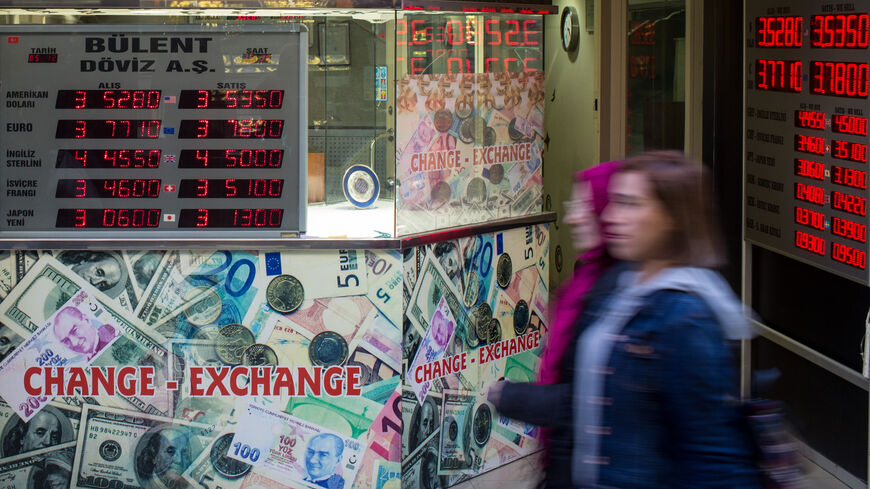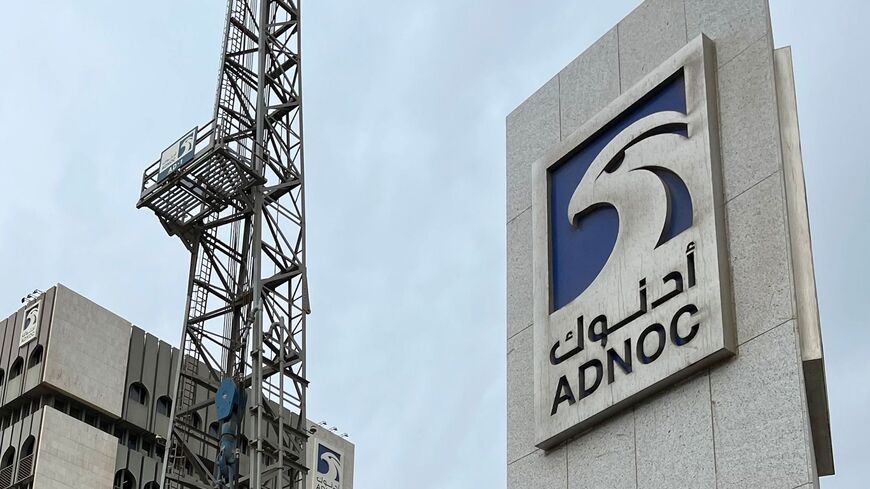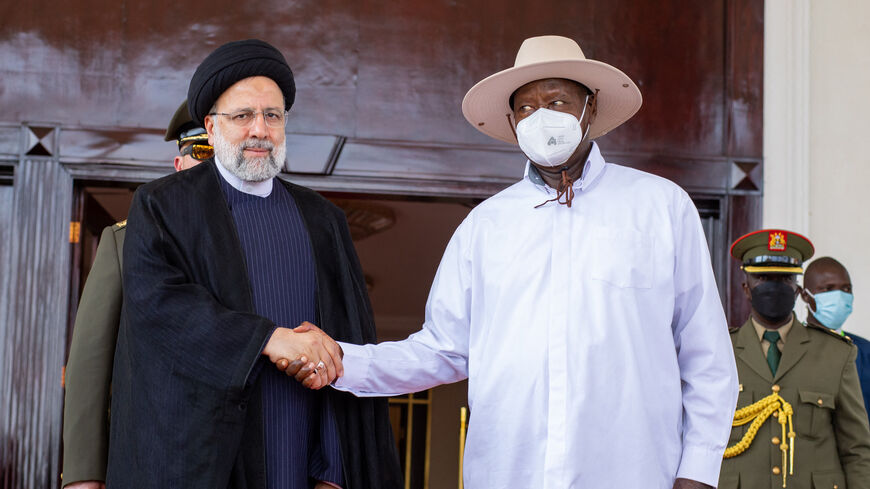Increased gold reserves help stabilize Turkey's currency ahead of May elections
Al-Monitor Pro Members
Piero Cingari
Financial analyst
March 22, 2023
In January, the Central Bank of Turkey (CBT) added 23 tonnes of gold to its official reserve holdings, maintaining the positive trend of the past year. The value of the CBT's gold reserves reached an all-time high of $50.6 billion and account for almost 40% of the CBT's gross foreign assets.
The CBT's new reserve management approach has coincided with a period of relative stability for the lira, but it has not been a driving force behind that. The "liraization" policy implemented by the government last summer led to a greater proportion of lira-denominated deposits and a reduction in exchange rate pressures. This year's general elections in Turkey will certainly be the most influential factor in determining the trend of the Turkish lira.
- The CBT continues to add gold to its foreign reserve holdings. According to figures issued this week by the World Gold Council, the CBT added 23.3 tonnes of gold in January, following an increase of 24.5 tonnes in December 2022. Overall, the CBT increased its gold holdings by 104.2 tonnes in 2022.
- As of January 2023, the official reserve assets of the CBT totaled $125.3 billion. They fell 2.6% on a monthly basis (m/m) but increased 14.2% from January 2022 (y/y). Overall, the value of CBT reserve assets continues to hover close to eight-year highs.
- Regarding the composition of CBT international reserves, foreign currency reserves totaled $67.2 billion, down 11% m/m and up 6% y/y, while gold reserves totaled $50.6 billion, up 10.3% m/m and 31% y/y, marking a fresh all-time high for the series. Gold now represents 40% of the total international reserve assets held by the CBT, the biggest share since June 2021.
- Boosting gold reserves is not a panacea for the CBT. The new reserve management strategy and the fact that gross reserve assets are hovering near their highest levels in eight years are not changing the persistent flaws in Turkey's net foreign reserve position.
- When foreign currency liabilities are subtracted, the CBT’s net international reserves amount to approximately $22 billion. Yet when contingent liabilities, such as FX swaps with domestic commercial banks and foreign central banks, are considered, CBT’s total net international reserves slip into negative territory (-$30 billion).
- The Turkish lira has experienced a period of relative market stability, despite the CBT continuing to cut interest rates by 50 basis points (bps) to 8.5% in February — a decision made to maintain supportive financial conditions and preserve growth momentum after the earthquake — and the country's annual inflation rate (55.2% in February) remaining significantly higher than the policy rate.
- Since October 2022, the lira has only lost a negligible 2% of its value against the dollar, faring significantly better than other EM currencies and even major G7 currencies.
- Even on the day following the earthquake, when the Istanbul Stock Exchange dropped 8% in a single session, the volatility of the lira remained exceptionally low.
- The relatively stable performance of the lira has little to do with the changes in CBT reserves management and much to do with the liraization strategy introduced by the government in the summer of last year. The objective of the liraization strategy is to progressively raise the proportion of TRY deposits in the banking sector so that the entire financial system becomes anchored on the Turkish lira, thereby contributing to the stability of the foreign exchange market.
- The liraization target for bank deposits is set at 60% for the first half of 2023: 57% of all deposits with domestic banks were denominated in TRY as of the end of February 2023, up from a 42% share before the government implemented the plan, according to CBT’s weekly money and banking statistics figures.
- Data confirms that Turkey's financial system has been effectively de-dollarized during the past year. TRY-denominated deposits have increased by 131% since February 2022, whereas FX-denominated deposits have increased by only 17.9%.
- As of mid-February, FX-protected deposits totaled TRY1,499bn (about US$80bn and 27% of TRY deposits in the banking sector).
- However, the domestic macroeconomic backdrop remains still fragile and doesn’t bode well for the lira. Despite the recent declines, inflation remains abruptly high and the level of real interest rates is deeply negative. The latest external sector data revealed a widening trade deficit in February (+53% y/y to $12.2 billion) and the public balance sheet further worsened and flipped to a deficit position.
- On May 14, 2023, general elections are scheduled to be held in Turkey to elect the president and 600 members of parliament. This major political event will be the key catalyst for the fate of the lira.
Scenario 1: Lira's stability continues as the status quo is preserved
In the run-up to the elections, the Turkish government intends to maintain the lira's stability while continuing measures to "de-dollarize" the financial sector.
Under the FX-protection system for lira deposits, the Treasury or the CBT compensates depositors for losses incurred if the lira falls more than the level of interest rate on these accounts. This effectively provides depositors with a free option to preserve the FX value of their deposits.
Since this system is projected to remain in place until at least for the first half of 2023, lira volatility may be prevented from rising significantly ahead of the elections.
The USD/TRY exchange rate is expected to climb marginally and in a managed way, following the pattern of the last six months and potentially reaching the 19.2-19.4 trading range before the elections.
In the event of no political change, liraization measures will be kept in place for longer, potentially extending the era of relative stability for the lira.
In terms of the CBT's foreign exchange reserves, the liraization measures limit financial account outflows, while reduced energy import costs and increased tourist inflows as the peak season approaches may enhance the current account position, hence improving reserves. A protracted period of relative stability for the lira does not necessitate the CBT selling its gold holdings, as it did in the past during times of high volatility, and hence we may expect the CBT gold reserve to rise in relative terms.
Scenario 2: Opposition is likely to win, and investors begin to price in traditional policies
We can anticipate volatility to return to the Turkish lira if polling data starts to suggest a less favorable outcome for Erdogan or if the opposition really prevails in the elections.
A change in political leadership is likely to necessitate a rethinking of the liraization strategy, with the new authorities opting for more traditional macroeconomic policies.
The opposition, in fact, argues for a return to orthodox monetary policy with an inflation-targeting framework, but abruptly transitioning from one regime to the other might destabilize markets, particularly FX-protected deposits.
As the government aims to phase off the FX-protection scheme, investors may begin pricing a more appropriate exchange rate, and the lira may face more volatility as it seeks a new equilibrium.
The USD/TRY exchange rate might potentially rise to at least 22 TRY to the dollar, implying a 15% depreciation.
Due to its unstable macroeconomic fundamentals, the Turkish lira would have seen considerably more volatility in recent months if liraization measures had not been implemented. Dollarization levels have fallen sharply since December 2022 as a result of the government's adoption of FX-protected deposits.
However, even if the domestic macroeconomic outlook remains problematic, the lira's trajectory in 2023 will most likely be dictated by political factors. Expect the lira to weaken only slightly in the short term by continuing the pattern of the previous six months as it is not in the government's best interests to accelerate the lira's depreciation in the lead-up to the May general election.
The election outcome and the extent of Erdogan's Justice and Development Party majority in parliament will have an influence on the lira's future path for the second half of the year. If the current president retains a strong parliamentary majority, the government will likely continue to pursue its liraization strategy until the end of 2023 as planned, which will keep the currency volatility limited and accelerate de-dollarization.
Piero Cingari is a financial analyst and writer who has worked as a fixed-income, FX and commodities analyst in the asset management and brokerage industry. Throughout his career, he has covered and analyzed economic and financial developments in Turkey, Egypt, and the Gulf countries. Piero is particularly interested in how major macroeconomic trends influence financial markets and how global geopolitical events may affect the economy of the MENA region.
We're glad you're interested in this memo.
Memos are one of several features available only to PRO Expert members. Become a member to read the full memos and get access to all exclusive PRO content.

Already a Member? Sign in
The Middle East's Best Newsletters
Join over 50,000 readers who access our journalists dedicated newsletters, covering the top political, security, business and tech issues across the region each week.
Delivered straight to your inbox.
Free
What's included:
Free newsletters available:
- The Takeaway & Week in Review
- Middle East Minute (AM)
- Daily Briefing (PM)
- Business & Tech Briefing
- Security Briefing
- Gulf Briefing
- Israel Briefing
- Palestine Briefing
- Turkey Briefing
- Iraq Briefing
Premium Membership
Join the Middle East's most notable experts for premium memos, trend reports, live video Q&A, and intimate in-person events, each detailing exclusive insights on business and geopolitical trends shaping the region.
$25.00 / month
billed annually
$31.00 / month
billed monthly
What's included:
Memos - premium analytical writing: actionable insights on markets and geopolitics.
Live Video Q&A - Hear from our top journalists and regional experts.
Special Events - Intimate in-person events with business & political VIPs.
Trend Reports - Deep dive analysis on market updates.
We also offer team plans. Please send an email to pro.support@al-monitor.com and we'll onboard your team.
Already a Member? Sign in






